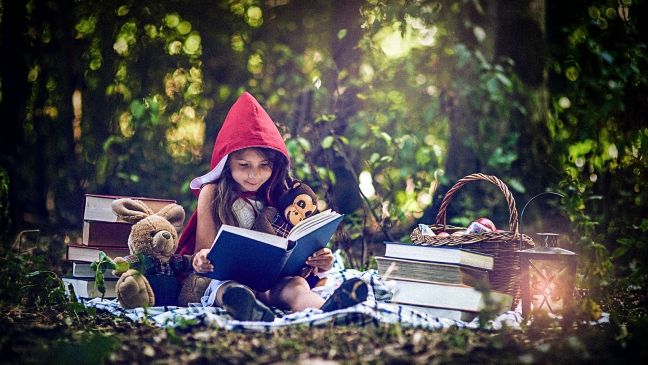The language in books is special and rare. For younger children, the vocabulary in books, and in book talk, offers vital language development. For older pupils, it helps to open up the academic curriculum.
New research from Kathy Rastle and colleagues - The Children and Young People’s Books Lexicon (CYP-LEX): A large-scale lexical database of books read by children and young people in the United Kingdom - captures the nature of the special words children read, and why these are different to the language of other media.
The researchers studied books targeted at children aged 7-16 and found that they contained more than 100,000 different words. Not only that, but these were words that didn’t appear on BBC television, either for young children or young adults.
Books more sophisticated than daily talk
A small number of function words (such as “and”, “but” and “is”) are unsurprisingly ever-present, making up more than half of the total words. Crucially, however, there are many other words and phrases, much more sophisticated than daily talk.
Highly complex words appear in the general reading books explored, with historical terms like “abolitionist”, “suffragists”, “legislature”, and scientific terms like “homunculus”. These words better match the tricky subject-specific vocabulary that emerges from the school curriculum.
In everyday media, such as age-appropriate BBC programmes, the language is mediated for accessibility.
This makes sense for good television and online media, but it means that a diet of BBC Bitesize or YouTube Shorts is unlikely to prove adequate in helping pupils learn the vast array of language they need for classroom success.
The findings may be what we expect - reading stories is both special and specialist - but the implications can be profound for the choices we make to help pupils learn language.
The language of books is something pupils can access before they even get to school. We know that access to book talk and lots of reading for pleasure with parents and caregivers confers an early language advantage.
But the proportion of young people (aged 8-18) who read daily is falling; fewer than three in 10 (28 per cent), according to a 2023 National Literacy Trust survey.
Maximising moments of reading
The implications are clear. It should be a national priority to promote reading early and widely to parents.
We also need to ensure that pupils do lots and lots of reading in schools, from reading for pleasure to targeting the tricky academic terminology needed to understand science textbooks, historical sources or geography case studies.
We should ask ourselves if we are confident that the reading experience of our students is being maximised in school. Many primaries have invested in book corners, while secondaries promote daily reading and other approaches. But such is the importance of reading, that every opportunity needs to be maximised.
Here are three practical considerations to help ensure reading is impactful and that pupils develop the special and rare vocabulary that can unlock their learning:
1. Prioritise high-quality book talk
There are some nuanced aspects of book talk that can maximise pupils’ comprehension of the language they read. Teachers identifying anchor points in a text where they stop and pose timely questions can be a helpful starting point, for example.
Carefully using reading comprehension strategies has also been shown to be useful for targeted questioning of a text.
2. Encourage ABC feedback
In his work on formative assessment, Dylan Wiliam proposes that we should “activate pupils as learning resources for each other”.
In ABC feedback, A stands for “agree with”, B means “build upon” and C is “challenge”. The approach gets pupils to actively engage with one another’s interpretations of the special language they read, building upon ideas and making richer inferences about tricky word meanings.
3. Select ‘Goldilocks texts’ for pupils of all ages
The aim of classroom reading is to build knowledge and expand pupils’ horizons. Therefore, they should read books with new, unfamiliar vocabulary, but also pitched in a way that is just right (so reading doesn’t prove a wholly frustrating experience).
This may include reading the likes of Katherine Rundell’s rich fiction at key stage 2 or selecting local place-based sources in history and geography in KS3 that have some familiar language and ideas.
Alex Quigley is the national content and engagement manager at the Education Endowment Foundation. He is a former teacher and author of Closing the Writing Gap, published by Routledge
For the latest research, pedagogy and practical classroom advice delivered directly to your inbox every week, sign up to our Teaching Essentials newsletter






